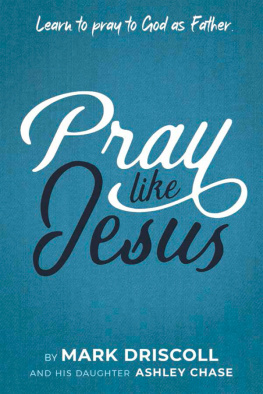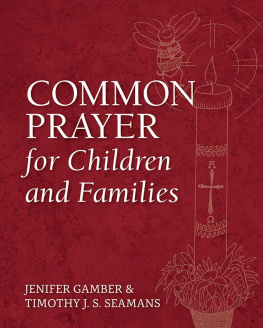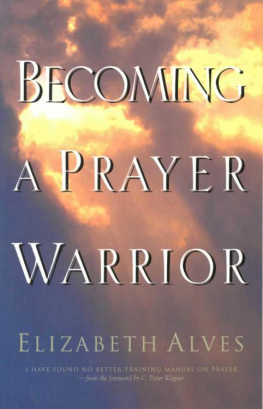If you love liturgy, this book is for you.
If you dont know what liturgy is, this book is also for you.
Whether you are over-churched or under-churched, a proud evangelical, a recovering evangelical, or not an evangelical at all; whether you are high church, low church, or no church, a skeptic or a Pentecostal; whether you have found a community or have burned out on community; this book is for you.
This is a different kind of book. Its not a book you pick up and read straight through. In fact, this book is not designed to be read alone. It is a book filled with songs, prayers, ideas, and memories that are meant to be spoken aloud and shared together in some form of community. That community may be your biological family or a small group of friends. It could be a gathering of folks in your public housing unit or dorm room, in your village or cul-de-sac. The early church met in homes and as congregations in local assemblies. Whatever form your community takes, this is a book about we, not me."
Common Prayer
There are so many different divisions of Christianity Greek, Russian, and Serbian Orthodox, Roman Catholic, Anglican, Reformed, Presbyterian, Baptist and Anabaptist, African Methodist Episcopal, Pentecostal, nondenominational, Mennonite and Quaker. By one count, there are more than thirty-eight thousand Christian denominations. Many people have said that the greatest barrier to becoming a Christian is all the division they see in the church.
Gods deepest longing is for the church to be united as one body. In Jesus longest recorded prayer, he prayed that we would be one as God is one. As one old preacher said, We gotta get it together, because Jesus is coming back, and hes coming for a bride, not a harem.
God has only one church.
This prayer book is the result of a collaboration of people from many different branches of Christianity, all of which come from one trunk if you trace the branches all the way back.
Folks are bound to ask if this prayer book is for Catholics or for Protestants. Our answer is, Yes, it is. We want the fire of the Pentecostals, the imagination of the Mennonites, the Lutherans love of Scripture, the Benedictines discipline, the wonder of the Orthodox and Catholics. Weve mined the fields of church history for treasures and celebrated them wherever weve found them. Weve drawn on some of the oldest and richest traditions of Christian prayer. And weve tried to make them dance.
Our prayer lives connect us to the rest of the body of Christ around the world; at any hour of any day, many of the prayers in this book are being prayed in some corner of the earth. Using these prayers is also a way of connecting ourselves to the past; were talking about the greatest hits not just from the 1960s, 70s, and 80s but also from the 1800s and the 300s. Many of these prayers and songs are more than a thousand years old.
A Word about Liturgy
Liturgy comes from the Greek word leitourgia, meaning public worship. When we hear the phrase public worship, many of us think of large meetings, like Sunday morning services, and while public worship can mean that, it doesnt have to take place in a big group. After all, public shares the same root word as pub, and it really just refers to a gathering of people to share life (and maybe a drink), a get-together thats always open to strangers joining in. Jesus promised that wherever two or three of us gather in his name, hell be there with us. Jesus will be with us at the pub whether theres wine or not (and if not, he might conjure some up, or conjure up grape juice for the Baptists).
For those of us who are new to liturgy, its noteworthy that, though there are some variations among different traditions, a majority of Christian liturgies around the world share an overall structure especially the liturgies of Catholics, Anglicans, Lutherans, Presbyterians, and Methodists. It has been said that if the covers were removed from the major worship books of the late twentieth century, it would be difficult to tell which book belongs to which church body. The major traditions follow pretty much the same script.
When we first experience the organized cycle of readings that is a part of liturgical worship a lectionary, as its often called it can seem like magic or a conspiracy. We may hear a pastor preach from the same text we read in morning prayer and think, How in the world? The Spirit must be moving! And, in fact, the Spirit is moving, just in a more organized way than we would have guessed. Some liturgical types smile when evangelicals discover the miracle of the liturgy. But it is a miracle nonetheless. So lean in and listen as you pray these prayers. Sometimes it may feel like you can hear the churchs heart beat as you pray in a way you never have before.
The readings of the church are arranged in a three-year cycle so that we hear the entire biblical story creation and fall, the exodus, captivity and return, the promise and advent of the Messiah, the coming of the Holy Spirit, and the promise of the coming kingdom. These cycles are used all over the world, so that on the same day, Christians in Africa are reading the same texts as Christians in Latin America. Since Common Prayer is designed to be repeated each year, we have done our best to honor these cycles, though weve squeezed them into only one year of readings.
Participating in the liturgy of the worldwide Christian community, whether on a Sunday morning or at another time, is more than attending a service or a prayer meeting. It is about entering a story. It is about orienting our lives around what God has been doing throughout history. And it is about being sent forth into the world to help write the next chapter of that story. Wandering the world in search of meaning and purpose, we may not even realize how desperately we need a story. But we know weve found something priceless when we find ourselves in Gods narrative.
Liturgy is not about getting indoctrinated. Doctrines are hard things to love.
Its not even really about education. Liturgy at its core is not about learning facts and memorizing phrases.
Liturgy is soul food. It nourishes our souls just as breakfast strengthens our bodies. Its sort of like family dinner. Hopefully you get some nutritious food, but more than nutrition, family dinner is about family, love, community. Liturgy is kind of like family dinner with God. Liturgical theologian Aidan Kavanaugh says it well: The liturgy, like the feast, exists not to educate but to seduce people into participating in common activity of the highest order, where one is freed to learn things which cannot be taught.
While liturgy is a party, its also about disciplining our spirits like we exercise our muscles. Certainly we are learning as we pray, as we listen to Scripture, as we learn the songs and stories. But we are also participating in the work of God active prayer, active worship. As we will see, liturgy offers us an invitation not just to observe but to participate. O Lord, let my soul rise up to meet you invites us to respond, As the day rises to meet the sun. When we hear, God is good, we want to call back, All the time. Liturgy is a dialogue, a divine drama in which we are invited to be the actors. We become a part of Gods story. We sing Gods songs. We discover lost ancestors. And their story becomes our story.


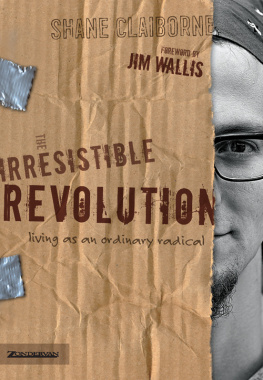
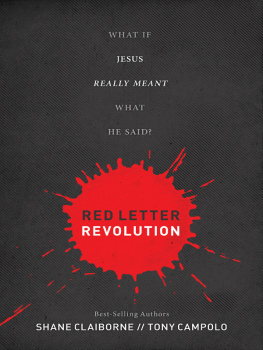
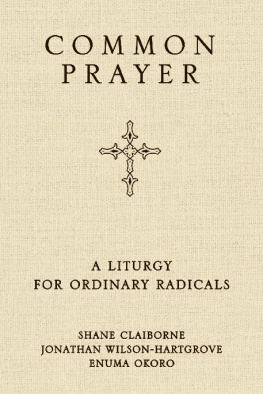
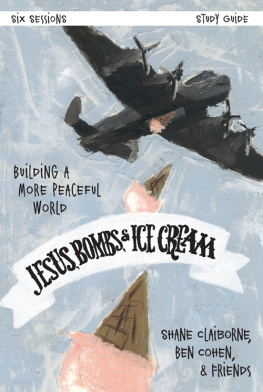
![The Standing Commission on Liturgy and Music - Daily Prayer for All Seasons [English Edition]](/uploads/posts/book/411072/thumbs/the-standing-commission-on-liturgy-and-music.jpg)
